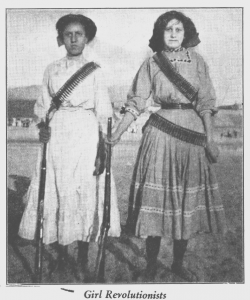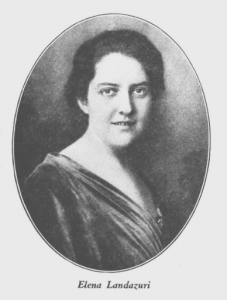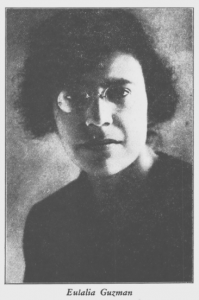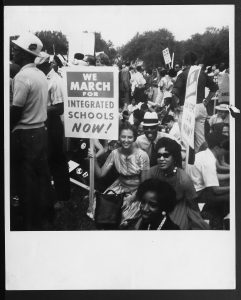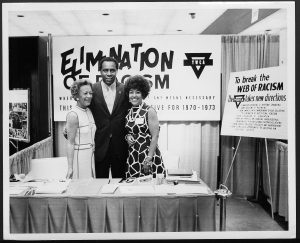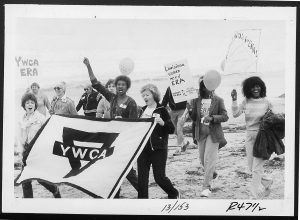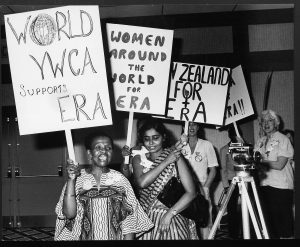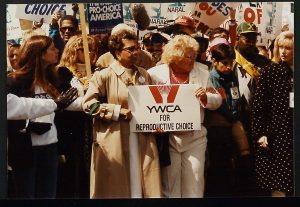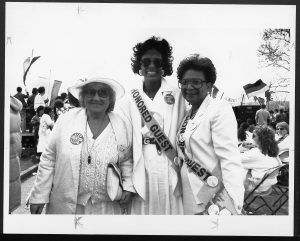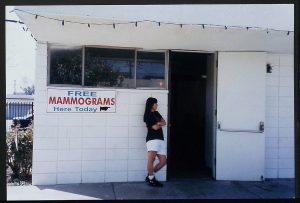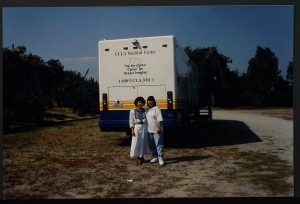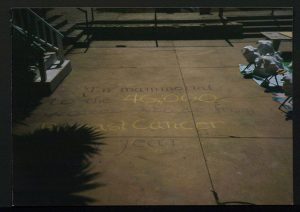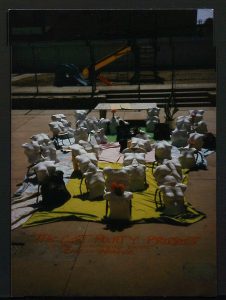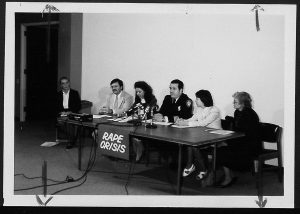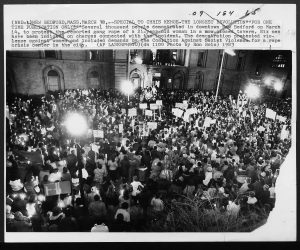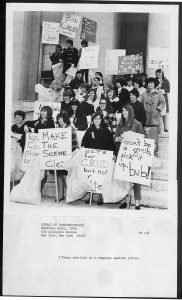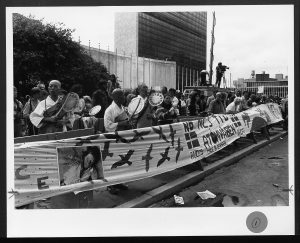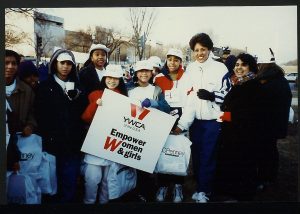By: Gracie Elliott, YWCA of the USA digitization project student assistant
Content Warning: This post talks about activism surrounding sexual violence.
I thought this week, in the spirit of staying inspired and fighting back, I would do some digging into the Y.W.C.A. archive to find examples of incredible activist women who have been on the frontline of fights like these, throughout history. It has been a rewarding, exciting and inspirational dig into the archive, and I am excited to share what I have found.
In a 1922 article for Womans Press, The New Movement in Mexico, Elena Landazuri described the lives and work of five Mexican women doing activist work during the Mexican revolution. She refers to them as founders and active members of “the Feminists” in Mexico. These women broke barriers in their personal and professional lives, and changed the landscape of social work in Mexico on a large scale. She wrote about Elena Torres, a woman she described as “leading the young generation.” Torres started fighting against gender discrimination in the workplace at her first job in a candy store. It was from there that she became interested in issues of labor and workers rights, and went to school so she could use her education to make a difference. She became interested in working against the exploitation of labor and resources that she was observing in her community as a result of the industrial boom, and as a result became active in the revolutionary cause. She became the first woman to act as private secretary for the governor in her state Guanajuato. At the time of the article’s publication Torres was working as the director of a meal program for children in poverty under the Department of Education, providing breakfast for over 9000 children per day. She also traveled around Mexico, giving speeches to women to inspire them to engage in the revolution, the women’s movement and the political climate in general.
Another woman Landazuri profiled is Ines Malvaez, who is described as an older member of the Mexican feminist group, was orphaned young and had been working since childhood, giving her a personal perspective into the struggle of laborers, which informed a lot of her activist work. She often worked as a liaison between political prisoners and the government. Her work in the social and public political spheres gained her intense levels of respect from all areas of the public sphere. Education reform was also highlighted in the article, and the final three women profiled, Acuna Rosete, Maria Arias Bernal and Eulalia Guzman, were all educators working to critique and reform the bureaucratic education system, and active members of the feminist movement. Rosete was a stay at home mother who realized the importance of economic freedom of women, and became a teacher and a bookkeeper that used her education to encourage other women to go to school and work jobs to maintain financial control and contribution to their families. Bernal became an administrator for a girls school, where she learned about the bureaucratic frustrations of the education system, and helped her students work around it. She later became the superintendent of the school, and reorganized the system and administration to be less corrupt, and work better for the students. She was also very active in the feminist movement, and the revolution, and gave passionate speeches that got her in trouble with the law. She was imprisoned, and upon release forced to move from place to place. She continued her activism by starting public libraries, women clubs, or reorganizing schools everywhere she moved to. These women were a power force in the Mexican revolution, and established the feminist movement in mexico, tackling important social issues like Labor exploitation, education corruption and gender discrimination in the workplace.
They were fearless trailblazers and worked tirelessly with the goal of being a “constructive social force” for the women and families of Mexico.
Those women were blazing forward way back in the 1920s, and were fighting many of the same fights that we are still facing today. When I read this article I was inspired and comforted by the fact that there are so many strong women, then and now, that are leading the movements and revolutions that are changing the social and political landscapes of our communities.
Y.W.C.A.of the USA members have also been on the forefront of many historically significant social movements. They had a large contingent marching in the March on Washington in 1963, and have been very focused on activism surrounding civil rights and racial equality.
In the 70s they officially adopted what is referred to as the “One Imperative,” with the goal of the “elimination of racism wherever it exists by any means necessary.” I found pictures in the Y.W.C.A. of the USA records photographs collection that depict activists at the 1963 march, as well as at a Convocation on Racial Justice in 1972 when the One Imperative was discussed.
Y.W.C.A. of the USA activists were also concerned with the passage of the Equal Rights Amendment, and have a long history of being vocal supporters of this bill. Y.W.C.A. of the USA women walked in marches in support of the ERA, like at the one pictured in San Diego California in 1981, and also performed demonstrations at the Y.W.C.A.of the USA’s National Convention.
Another cause that the Y.W.C.A.of the USA has been a vocal fixture of, is fighting for Women’s personal and reproductive health and freedom. Over the years this has looked like joining iconic protest demonstrations, like the March for Women’s Lives in April 1992, where they demanded freedom of choice and access to abortion.
There is another collection of photos taken in California in the 90s that details the activities of a traveling women’s health bus that provided on-the-go mammograms. In this photo series there are also photographs of an art installation called “The Cast Party Project,” pictured here, Descriptions in chalk on the ground beside the installation dedicate it to the 46,000 women each year who die from breast cancer.
There is another collection of photos describe the Y.W.C.A.of the USA’s involvement in the the protest of a gang rape that occurred in New Bedford, Pennsylvania in 1983. They participated in the protests that gathered after the incident, that were demanding the establishment of a rape crisis center in New Bedford, and negotiated with the New Bedford police department and the Greater Harrisburg Area Y.W.C.A. in the establishment of a rape crisis services division within the chapter, and a rape crisis center in the city.
Y.W.C.A. of the USA activists have also been involved in other human rights and environmental issues. These activities included attending marches and protests against the use of nuclear weaponry and attending the anti-nuclear protest outside the United Nations in New York City in 1982– a protest that attracted three quarters of a million people. Y-Teens also mounted anti-littering campaigns and organized to reduce waste and trash in their communities by distributing trash cans, and marching with a green, anti-littering message.
These photographs and articles were found in the YWCA of the U.S.A. records, housed in the Sophia Smith Collection at Smith College in Northampton Massachusetts. Additionally, these materials are part of a YWCA digitization project and will be available digitally upon completion of the project. If you want more inspiring examples of activism by Y.W.C.A. of the USA women and teens throughout history check out this archive of rich activist history.
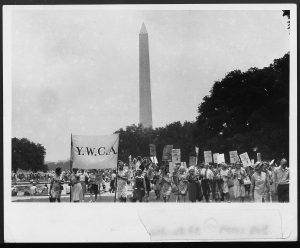
Y.W.C.A. Women marching in 1968
Y.W.C.A. Women marching in 1996

